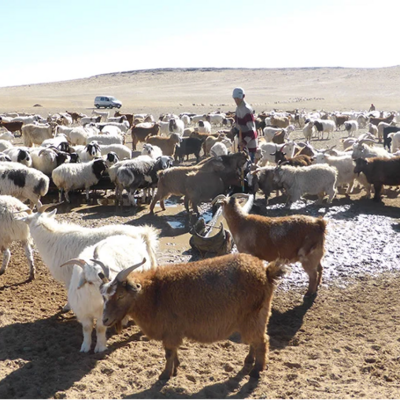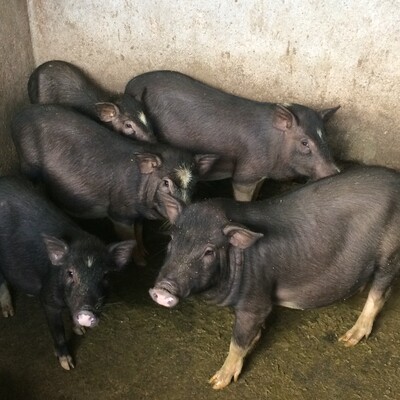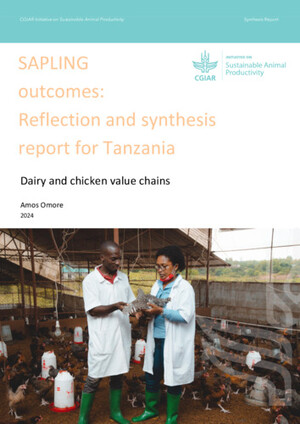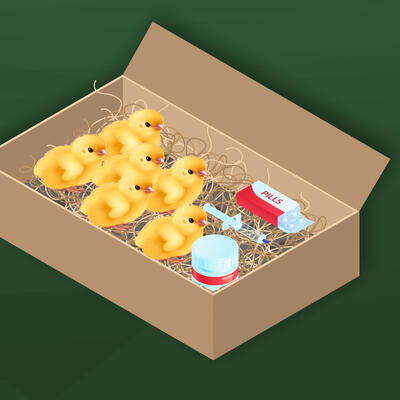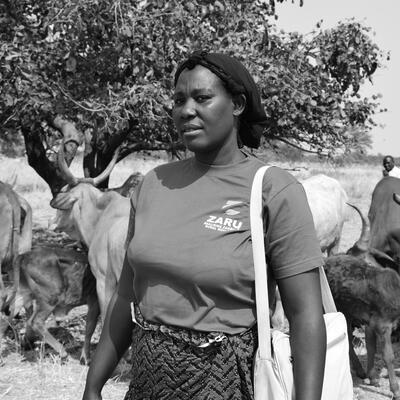
Key insights from the Nigerian Livestock Sector Assessment workshop
Stakeholders from Nigeria’s livestock sector recently gathered in Abuja for the Livestock Sector Assessment (LSA) workshop, bringing together over 75 participants from private, public, academic, and research sectors. This workshop arrives at a crucial juncture for the nation's livestock sector, with the establishment of the new Ministry of Livestock Development signaling a renewed commitment and paving the way for initiatives like the Nigeria Livestock Master Plan (N-LMP).
Preceding the LSA workshop, a one-day animal health-focused meeting convened about 20 state and private veterinary practitioners from all geopolitical zones of Nigeria, including Dr. Columba Vakuru, Director of the Department of Veterinary and Pest Control Services at the Federal Ministry of Agriculture and Food Security (FMAFS). The meeting reviewed findings from the Animal Health Working Group, a key thematic area of the N-LMP, which covers major livestock species and their production systems.
Building on last year’s N-LMP launch and Baseline workshop, the aim of the LSA workshop was to review and validate qualitative and quantitative data on the current status of Nigeria’s livestock sector, identifying gaps, constraints, and opportunities. The workshop also outlined strategic interventions needed to achieve a stakeholder-driven vision for the sector’s growth.
Key takeaways from the workshop
Presentations by Veronique Alary, Agro-Economist at CIRAD showcased the LSIPT analysis results while Thijs Wissik presented estimates from the 2022 National Agricultural Sample Census, highlighting the opportunities and challenges of Nigeria’s vast livestock resources. Livestock's GDP contribution is substantial, with meat products generating over 6 trillion Naira annually. To ensure that the modelling results accurately reflect the Nigerian livestock context and priorities, experts validated and provided feedback on economic performance, value addition, and contribution of livestock to Nigeria’s GDP.
However, numbers alone will not bring change to the Nigerian livestock sector. ILRI Consultant Oladeji Bamidele emphasized the workshop’s dual focus on both reviewing sector assessments and envisioning the future. He stressed the need for precise language in addressing complex issues, which is essential for effective communication and decision-making during the process.
Not all details can be captured through number, so engaging and interactive breakout discussions divided by value chains were facilitated to identify critical issues livestock actors face day-to-day. Top challenges included low productivity across all value chains, limited awareness of the pig sector, poor nutrition in the cattle value chain, high feed costs, genetic limitations with over-reliance on exotic breeds, and low investment in the sector. Participants were able to identify root causes, key actors, and actionable steps to address these challenges, along with strategies to overcome obstacles and leverage opportunities for sustainable growth.
A co-creation success story: Stakeholder testimonies
Through stakeholder validation, the N-LMP accurately reflects the Nigerian livestock sector and tackling critical challenges farmers are facing right now. During the workshop, Mohammed Bello Tukur, secretary general of the Confederation of Traditional Livestock Breeders (COTLB), highlighted the importance of modernizing traditional farming practices.
"Traditional livestock producers need to improve their production systems," Tukur noted. "We can't expect different results by doing the same things over and over again. The world is moving fast, and we must adapt to these changes."
Tukur further encouraged livestock producers to invest in pastures, water management, and veterinary care to enhance productivity. He also underscored the need for bridging the gap between research and practice by adopting new technologies and improved breeds.
The workshop received praises for its collaborative approach. The president of the Nigerian Institute of Animal Science (NIAS), Prof Udo Herbert expressed his satisfaction, emphasizing that a clear roadmap for the industry’s future is being drawn.
Moses Arokoyo, president of the Nigerian Veterinary Medical Association (NVMA), highlighted the sense of ownership the process gives.
“It is always good to be part of something from the beginning because it gives a sense of belonging and ownership when everyone puts knowledge, value and addition to the process”, he stated.
Maryam Mohammad, Director and Chief Executive of the National Veterinary Research Institute (NVRI), specifically praised the interactive nature of the workshop's breakout groups, noting that they were "very productive and engaging."
For Rabiu Hassan, Executive Director of National Animal Production Research Institute (NAPRI), the workshop proved to be a significant learning opportunity. He recounted his previous struggles with some concepts in his early years, noting that the experts present had provided valuable clarification. In his words, "This is not just a workshop, but also a learning procedure for me and other colleagues."
Other participants commended the workshop’s inclusive nature, appreciating the strong gender representation and diverse stakeholder participation. The interactive sessions were particularly valued, fostering healthy debates and critical thinking.
One participant noted, “The practical approach and focus on real-world solutions made this workshop truly impactful.”
Another remarked, "The healthy arguments and brainstorming sessions by experts were all mind-blowing."
Private sector roundtable: Addressing critical challenges
To boost Nigeria’s livestock sector, we need all stakeholders on board, especially the private sector. A post-workshop roundtable between private sector players and the ILRI N-LMP team led by ILRI’s Joseph Karugia, focused on private sector priorities that would enable sustainable growth in the livestock industry. Key discussions centered on behavioral change among sector actors, enhanced engagement with government mechanisms, and addressing the nation’s feed gap. The group proposed expanding fodder production as an independent value chain to tackle feed shortages more effectively.
Some other pressing challenges discussed were climate change, security issues in northern regions, currency devaluation driving cattle sales to neighboring countries for more profit, and logistics for transporting feed to remote areas where majority of the farmers are located. The group recommended prioritizing all the challenges in collaboration with the government, and tackling them based on importance, with the issue of insecurity and constant power supply emerging as top priority. Engaging state governors as well as the senate and house of representative committee’s on agriculture and livestock early in the finalization of the N-LMP was also proposed to ensure broader ownership and actionable support in addition to supporting youth and SMEs in urban areas.
Kindly visit the ILRI Livestock Master Plan website for more information.
You may also like
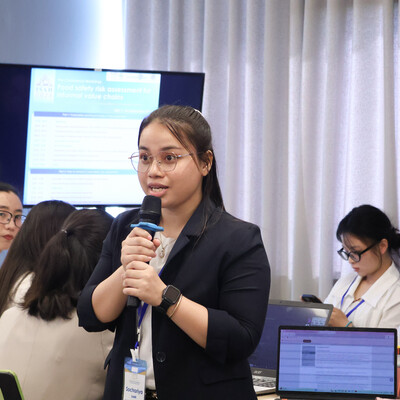
ILRI News
Workshop on food safety risk assessment strengthens capacity in informal value chains in Southeast Asia
ILRI News
SAPLING's study tour highlights successes and future opportunities in sustainable livestock farming in Northwest Vietnam
Related Publications
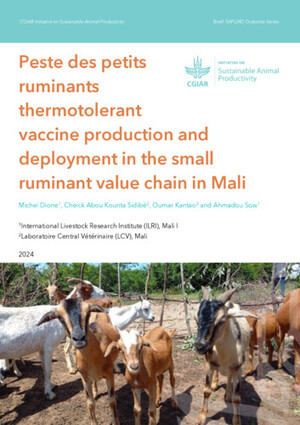
Peste des petits ruminants thermotolerant vaccine production and deployment in the small ruminant value chain in Mali
- Dione, Michel M.
- Sidibé, C.A.K.
- Kantao, O.
- Sow, Ahmadou
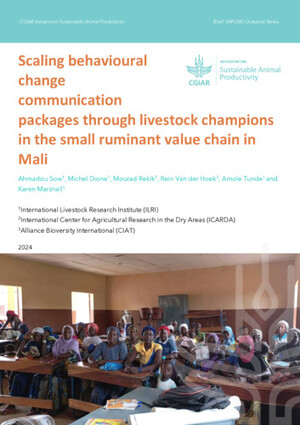
Scaling behavioural change communication packages through livestock champions in the small ruminant value chain in Mali
- Sow, Ahmadou
- Dione, Michel M.
- Rekik, Mourad
- Hoek, Rein van der
- Tunde, Amole
- Marshall, Karen
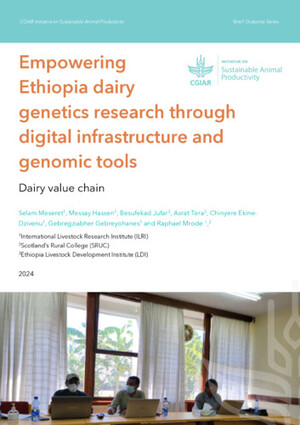
Empowering Ethiopia dairy genetics research through digital infrastructure and genomic tools: Dairy value chain
- Meseret, Selam
- Hassen, Messay
- Jufar, B.
- Tera, A.
- Ekine-Dzivenu, Chinyere C.
- Gebreyohanes, Gebregziabher
- Mrode, Raphael A.
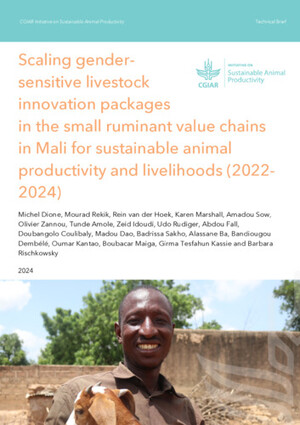
Scaling gender-sensitive livestock innovation packages in the small ruminant value chains in Mali for sustainable animal productivity and livelihoods (2022-2024)
- Dione, Michel M.
- Rekik, Mourad
- Hoek, Rein van der
- Marshall, Karen
- Sow, Ahmadou
- Zannou, Olivier
- Amole, Tunde A.
- Idoudi, Zied
- Rudiger, Udo
- Fall, Abdou
- Coulibaly, Doubangolo
- Dao, Madou
- Sakho, B.
- Ba, A.
- Dembélé, B.
- Kantao, O.
- Maiga, B.M.
- Kassie, Girma T.
- Rischkowsky, Barbara A.





